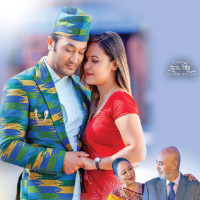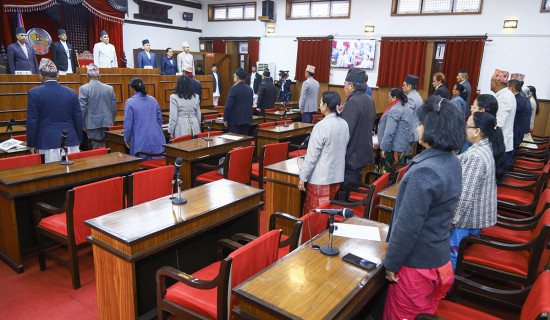- Monday, 9 February 2026
Ekta: A nostalgic documentary of 1974 A.D.
By Mannu Shahi,Arguably one of the most celebrated figures of the Nepali music industry, 1974 A.D. is a sensational musical supergroup that rejoices in its four-decade-long extravagant career with its virtuosic musical skills and profound group chemistry.
Formed in the early 90s’, the band categorises their vast repertoire of music as a mixture of Nepali folk, raga, rock, funk, blues and jazz. Phiroj Shyangden on vocals/guitars, Nirakar Yakthumba on bass, Adrian Pradhan on drums/vocals, Manoj Kumar KC on guitars, Sanjay Shrestha on percussion and Manose Singh on bamboo flute collectively form the outfit’s stagnant line-up.
Their discography includes eight albums: Time Out (1996), Samjhi Bash Chu (1998), Satabdi (2001), Jungi Nishan (2002), Pinjada Ko Suga (2004), On Air (2007), Aath Athara (2010) and Nirantarta (2019). The band also released an eight-track album ‘Hazar Sapana’ in 2016 under the 1974 AD banner during a phase where some of the leading faces of the group were replaced with young talents like Rohit John Chettri, Prajjwal Mukhiya, Jacko Wacko and Pratick Baniya.
Their decision to amend the broken ties delighted a plethora of their followers and ensuing the reconciliation in 2019 their journey remains a smooth sail. Their official social handles also have been flooding with reprised tunes, lyrical videos, live sessions, performance bootlegs and more delightful content expanding and experimenting further with their
already polygonal vocabulary.
Similarly, last Sunday, August 13, the group released a documentary titled ‘Ekta’ capturing 1974 A.D. in their heydays functioning as the artistic centrepiece of a momentum oozing out of the political instability prevailing in the country at that period. Shot and edited in 2005 by two Dutch filmmakers: Ruth Van der Veen and Paul Kleinheerenbrink; the documentary features Suraj Shahi on additional cinematography; Sachin Shrestha on additional editing and graphics; the band’s guitarist Manoj Kumar KC on audio works; Moonlight Records on co-production.
The film showcases the outfit’s journey from its initial success days to its ultimate peak generating massive support from its audiences globally. The line-up apparent at the time frame of 2003-2005, during the shoot of the documentary comprises Bhanu A on guitars, Nirakar on bass, Adrain on drums/vocals, Sanjay on percussions, Phiroj on guitar/vocals, Manoj on guitar/keyboard, Brian on trumpet and Bijaya Manandhar as the band manager. Nonetheless, Manose Singh on flute also gets a generous screen time during the 36 minutes length of the movie.
From the band’s practice sessions, one on one interviews, concert clips, writing process, international tours, and personal group dynamics to more serious notions of their career as releasing their staple song “Sambodhan” subsequent to the Royal Massacre in 2001, the film has well-archived all significant achievements of the group.
“Sambodhan”, originally written by Adrian Pradhan as a tribute to his music teacher after his demise, was later dedicated to the Royal Family past the tragic incident which had torn the country apart; thus, Nepalis of all caste, creed and ages immersed their bittersweet melancholy with this tune. The already prominent 1974 A.D. embodying patriotic anthems thereafter became a household name for the coincidental relevancy of their music.
This resulted in the enormous turnout in their 2002’s Rock Yatra Concert as their followers crowded Rangalashala stadium and exceeded further to completely shut down the streets of Tripureshwor, a sight also captured in the movie. Times before the personally customized algorithms of the Internet, when everyone listened to the same music playing via the television or radio stations, 1974 A.D. along with their contemporaries are definitely the last larger-than-life icons of the country creating socially crucial music resonating to Nepalis of various backgrounds and this film is a heartwarming documentation of their euphonious voyage.










-original-thumb.jpg)





